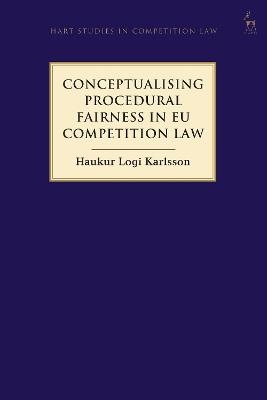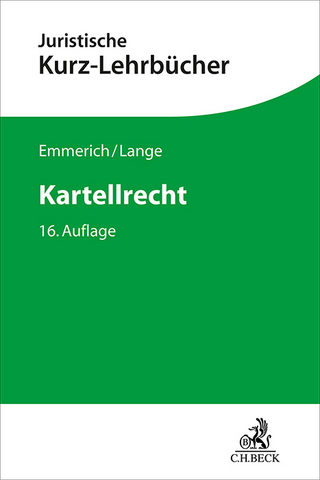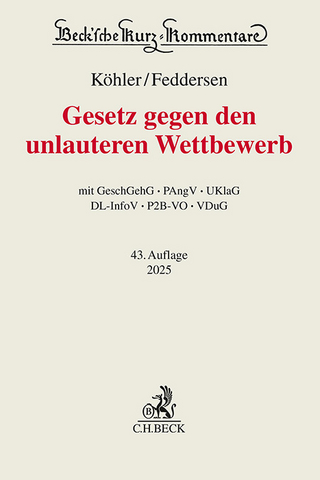
Conceptualising Procedural Fairness in EU Competition Law
Hart Publishing (Verlag)
978-1-5099-4458-3 (ISBN)
This innovative book seeks to understand the philosophical considerations at the core of conflicting procedural fairness arguments in EU competition law practice. The author argues for a conceptualisation of procedural fairness as a distributional issue that can be solved by a practical fairness theory and a comprehensive methodology. To illustrate the usefulness of the conceptualisation, three procedural fairness problems from recent EU competition law practice are analysed:
- the KME–Chalkor cases;
- the Groupe Gascogne cases;
- the regulatory question about using a collective redress mechanism for private enforcement of EU competition law.
This unique approach provides a robust philosophical and methodological foundation for arguing about a wide range of procedural fairness dilemmas. The book is a must-read for academics and practitioners seeking an imaginative perspective on the philosophical foundations of arguments about procedural fairness in EU competition law and beyond.
Haukur Logi Karlsson is Postdoctoral Fellow at the Law Department of Reykjavik University.
1. The Problem of Procedural Fairness
I. Procedural Fairness in EU Competition Law
A. The KME/Chalkor Argument
B. The Elements of KME/Chalkor Dilemma
C. The KME/Chalkor Dilemma in Context
II. Towards a Conceptualisation of Procedural Fairness
2. The Essence of a Procedure
I. Differentiating Procedural Law and Substantive Law
II. Procedures as a Social Institution
III. The Institutional Elements of an Adjudicative Procedure
A. Instrumental Structure
i. Constitutive Rules
ii. Culture
iii. Sanctions
B. Normative Function
i. The Deontological View
ii. The Consequential View
iii. The Functional Essence of a Procedure
IV. Towards a Conceptualisation of a Fair Adjudicative Procedure
3. The Structure and Function of EU Competition Procedures
I. The Normative Purpose of EU Competition Law
II. Stakeholders and Stakes in Competition Proceedings
A. The Main Stakeholders
B. The Main Stakes
III. The Structure of the EU’s Competition Law Procedure
IV. Instrumental Structure and Normative Function
A. The Constitutive Rules of EU Competition Law Procedure
B. The Institutional Culture of DG Competition
C. The Procedure before the CJEU
D. Institutional Sanctions
V. Arguments about Procedural Fairness in EU Competition Law
4. Ethics for Procedural Architects
I. Ethics and Legal Theory
II. Ethics beyond Legal Theory
A. The Social Contract Narrative
B. Hobbesian Ethics and Game Theory
C. Contractarian Ethics and Democratic Institutions
III. Ethics as the Dark Matter of the Law
5. The Model of Fair Rules
I. The Role of the Rule Architect
II. Rulemaking as a Decision Problem
III. The Elements of the Model of Fair Rules
A. The Policy Objective of a Rule
B. Unifi cation of Moral and Efficiency Claims
C. Interpersonal Comparison of Stakeholder Claims
D. Registration of Preferences into Pay-off Matrices
E. Identifying Fair and Efficient Rules
IV. The Utility of a Model for Identifying Fair Rules
6. Analysis of Three Fairness Dilemmas
I. The KME/Chalkor Cases
A. Analysis of the Cases
B. Subsequent Developments
C. The Court’s Approach to the Fairness Issue
II. The Groupe Gascogne Cases
A. Analysis of the Cases
B. The Court’s Approach to the Fairness Issue
III. Collective Redress for Private Enforcement of Competition Law
A. Analysis of the Legislative Dilemma
B. The Commission’s Approach to the Fairness Issue
IV. Symptoms of an Underdeveloped Theory of Procedural Fairness
7. An Argument for a Data-based Democracy
I. Conceptualisation of Procedural Fairness in EU Competition Law
II. Solving Fairness Issues in EU Competition Procedure
A. Applying the Model of Fair Rules
i. Step 1: Identifying the Primary Policy Objective
ii. Step 2: Preference Function
iii. Step 3: Preference Index
iv. Step 4: Preference Matrices
v. Step 5: Identifying Fairness
B. Assessing the Utility of the Model
III. Technocracy and the Making of Laws
IV. Data-based Democracy for Regulating EU Competition Procedure
| Erscheinungsdatum | 16.03.2022 |
|---|---|
| Reihe/Serie | Hart Studies in Competition Law |
| Verlagsort | Oxford |
| Sprache | englisch |
| Maße | 156 x 234 mm |
| Themenwelt | Recht / Steuern ► EU / Internationales Recht |
| Recht / Steuern ► Wirtschaftsrecht ► Wettbewerbsrecht | |
| ISBN-10 | 1-5099-4458-3 / 1509944583 |
| ISBN-13 | 978-1-5099-4458-3 / 9781509944583 |
| Zustand | Neuware |
| Informationen gemäß Produktsicherheitsverordnung (GPSR) | |
| Haben Sie eine Frage zum Produkt? |
aus dem Bereich


